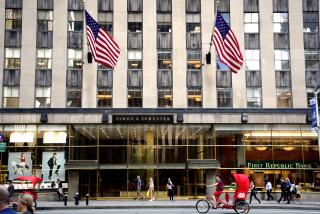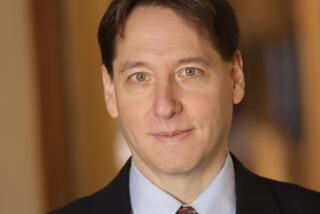Harcourt Brace Chairman Quits : Publishing: William Jovanovich passes the job on to former Energy Secretary John Herrington. The longtime executive successfully fought off a hostile takeover bid but leaves the firm with huge debt.
- Share via
NEW YORK — William Jovanovich, the unconventional publisher who led Harcourt Brace Jovanovich for 35 years, has turned over his post as chairman of the book publishing conglomerate to former Energy Secretary John S. Herrington.
Announcing the appointment Tuesday, Harcourt’s board said it had also given Jovanovich’s son, Peter, who is chief executive and president, the added title of chairman of the executive committee.
William Jovanovich, 70, made what was once a second-tier firm one of the nation’s foremost book publishers.
But in 1987, fighting off a hostile takeover attempt by British media magnate Robert Maxwell, he saddled the company with a burden of debt that has brought consistent losses and sent company stock from a high of more than $64 a share to a current price of about $3. Some have questioned whether the company can survive in its present form.
The senior Jovanovich gave up the chief executive’s title last year, and his surrender of the chairman’s title had been expected for some time. The resignation was a “non-event,” said J. Kendrick Noble, analyst with Paine Webber Inc. brokerage in New York.
William Jovanovich will continue as a Harcourt editor and also plans to write books.
In an interview, Herrington, a Los Angeles native and longtime associate of former President Ronald Reagan, said management’s priorities will be to bring Harcourt’s publishing operations “back to pre-eminence and simultaneously dealing with the debt problem.”
He said he intends to immediately begin a comprehensive review of what can be done to ease Harcourt’s indebtedness. But Herrington declined to provide specifics on what course he might recommend.
Herrington, an attorney, described Harcourt as a “fine company with a lot of basic parts,” but which, as did many other companies, “came out of the ‘80s with too much debt. . . . It was a victim.” But he defended William Jovanovich’s decision to take on debt to keep the company independent.
Harcourt incurred about $3 billion in debt to fight off Maxwell. To pay off the debt, Harcourt recently sold its theme parks for $1.1 billion, which was substantially below the $1.5 billion officials had said they expected.
Meanwhile, as the company’s core textbook publishing operations slumped, interest payments rose to $240 million last year.
Most daunting, in 1992 Harcourt will have to pay $140 million in other debt, including “payment-in-kind” junk bonds issued during the battle with Maxwell.
The company must also deal with several lawsuits from shareholders, who say the company inflated its stock price with misleading financial statements.
Herrington described the suits as no more than “run-of-the-mill, typical” shareholder actions.
One analyst, Ivan Obolensky, with Josephthal & Co. in New York, said he admired Peter Jovanovich but believed that he was a “young man in a tremendously difficult position.”
Obolensky predicted that Harcourt would be forced to ask the holders of some of its junk bonds to swap them for lower-yielding bonds, as so many other junk-burdened companies have lately been forced to do.
More to Read
Sign up for our Book Club newsletter
Get the latest news, events and more from the Los Angeles Times Book Club, and help us get L.A. reading and talking.
You may occasionally receive promotional content from the Los Angeles Times.









